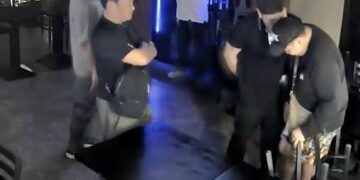For failing to show up at a Senate Foreign Relations committee hearing headed by her, Sen. Imee Marcos said she was compelled to act on a motion from Sen. Ronald dela Rosa to issue a subpoena on Cabinet officials, to either show up next hearing or face contempt raps.
The Senate body has been investigating the arrest of former president Rodrigo Duterte and his send-off to The Hague.
The officials who refused to attend were Justice Sec. Jesus Crispin Remulla, Interior Sec. Jonvic Remulla, Defense Sec. Gilbert Teodoro, Foreign Affairs Sec. Enrique Manalo, National Security Adviser Eduardo Ano, Philippine National Police chief Gen. Rommel Marbil, PNP spokesperson Brig. Gen. Jean Fajardo, Criminal Investigation and Detection Group chief Nicolas Torre III, Philippine Air Force commanding general Arthur Cordura, and Prosecutor Gen. Richard Anthony Fadullon.
Interior Sec. Remulla and Ano had initially confirmed their attendance but later declined, according to Sen. Marcos.
The Executive department officials did not attend on the advice of Executive Secretary and retired Supreme Court chief justice Lucas Bersamin, who invoked executive privilege and the sub judice rule.
The Palace had reasoned that the officials had exhaustively answered the senators’ questions during the previous March 20 hearing.
In her opening statement, Marcos said: “I respect the doctrine of executive privilege but this should not be used as a blanket shield to evade a Senate invite. There is a saying ‘hidden truths are unspoken lies.’ The truth that is being hidden is also a lie, and that is what is happening. By using executive privilege and sub judice to hide the truth, it is appearing to be a cover-up.”
Sen. dela Rosa warned of a constitutional crisis following the “total snub” of the Senate by the Executive department, a co-equal branch.
He said Malacañang had deprived the Senate of its role to provide “checks and balances” in the government.
The Palace belied the warning, with Presidential Communications Office undersecretary Claire Castro citing SC decisions that affirmed Executive privilege, such as Neri vs Senate committee and Senate vs Ermita.
Castro said Dela Rosa should “read these cases so he can be enlightened.”
She added that Dela Rosa could have relayed his questions to the Cabinet officials had he been present at the first hearing.
Speaking in the vernacular, Castro said: “Doesn’t he remember that there was a first hearing and he was not present? That was his opportunity to ask. So he should not put the blame on others now that Cabinet officials did not attend the second hearing.”
Bersamin said that some of the topics of the Senate hearing were covered by executive privilege.
“When we learned about the topics because the invitation of Sen. Imee was quite specific about the topics so we had looked at this invitation and we determined that there are probably or likely topics covered by these matters that would come under executive privilege,” he said.
Senate President Chiz Escudero said he could not yet sign the subpoenas as they had to go through the Senate’s legal department, so as to avoid the constitutional crisis as Dela Rosa counseled.
“The last thing I want to happen is to make things worse in the country by triggering a constitutional crisis,” said Escudero.



























